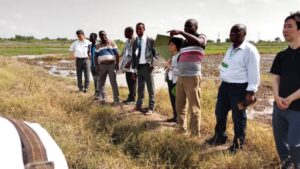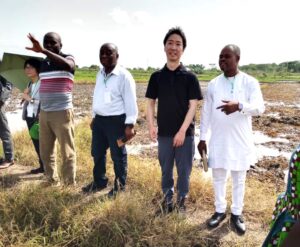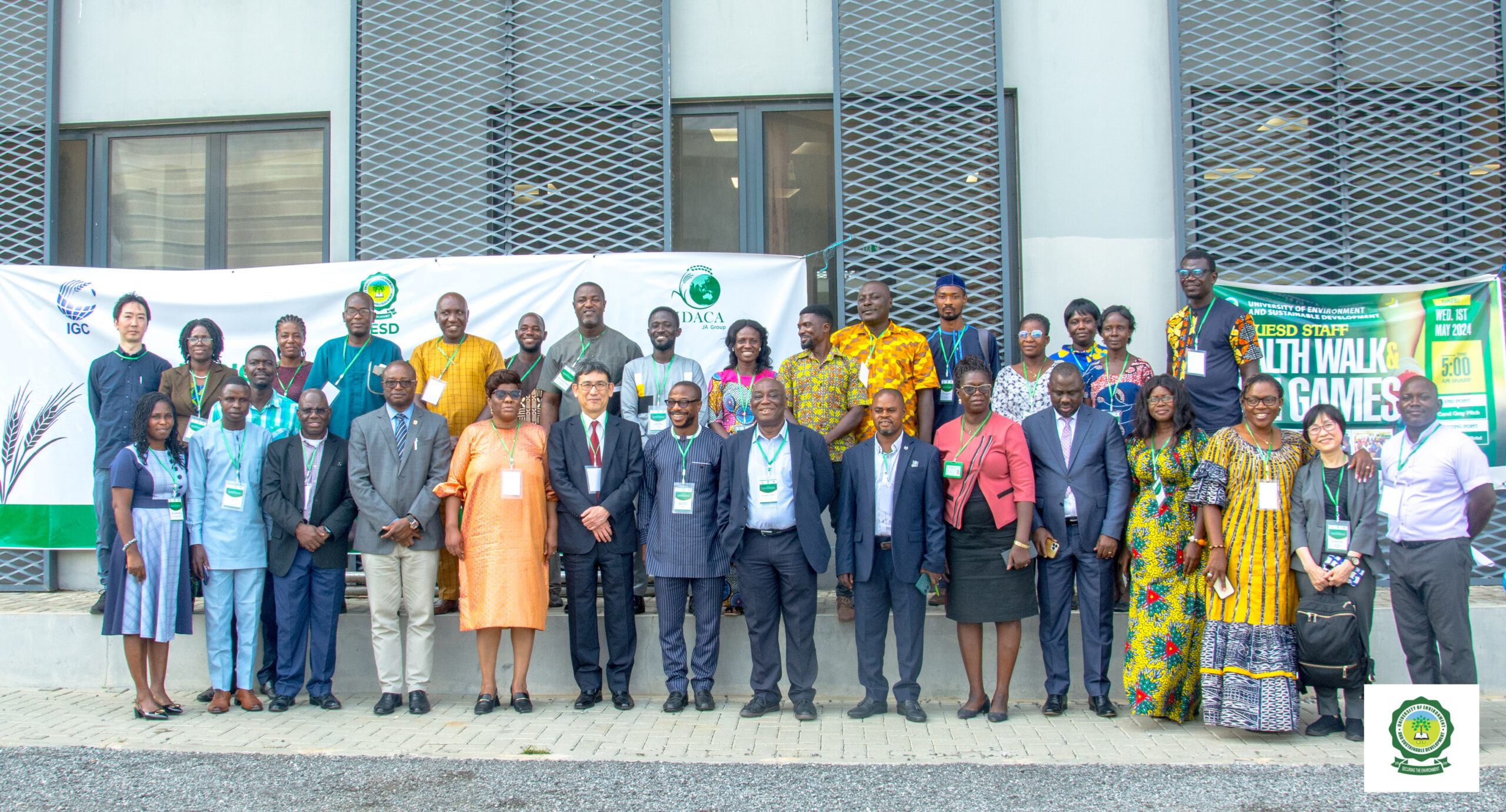The University of Environment and Sustainable Development (UESD), hosted a two-day Regional Seminar on: Maize/Rice under the International Grains Council (IGC)/Institute for the Development of Agricultural Cooperation in Asia (IDACA): A Survey to Collect Market Information in Asia, the Pacific, and Africa. The Regional Seminar took place on the 17th and 18th April 2024 at UESD’s Video Conference Room.
The event which brought together experts and researchers, in agriculture, and industry from Ghana including UESD faculty, Cameroon, Nigeria, Japan, and Cote d’Ivoire discussed critical aspects of global grains, food security, and market transparency.
Key experts and industry stakeholders included; the Pro-Vice-Chancellor of UESD, Prof. Edward Wiafe Debrah; the Executive Director of IGC, Arnaud Petit, An Agricultural Economist/Rural Finance Specialist from the University of Greenwich, Dr. Gideon E. Onumah; the Regional Director of ICA Africa, Dr. Sifa Chiyoge; the Municipal Director of Cooperatives in Ghana, Ms. Pamela Quaye and the Executive Director of IDACA, Dr. Hirofumi Kobayashi, who moderated the event.
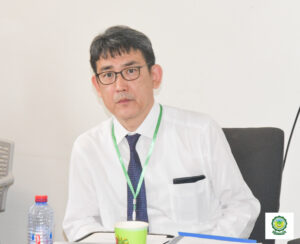
In his welcome message, the Vice-Chancellor of UESD, Prof. Eric Nyarko-Sampson described the Seminar as timely as it brings attention to the issue of grains. It is important to bring discussions on grains to the front burner so, ‘we commit attention to the whole process from beginning to end including when it gets to the consumer, ’ he added.
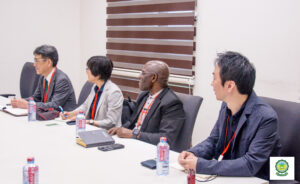
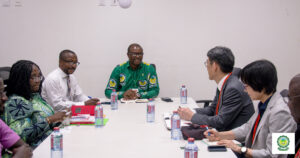
The first day commenced with keynote presentations addressing the global grains situation. The Executive Director of IGC, Mr. Arnaud Petit outlined the objectives of the International Grains Council which include enhancing market transparency, fostering international cooperation, and promoting trade expansion. His presentation addressed aspects such as food aid commitments, trade barriers, and challenges.
A pivotal moment of the seminar was the presentation by UESD’s Pro-Vice-Chancellor, Prof. Wiafe Debrah, which provided an overview of Ghana’s maize market dynamics, shedding light on factors influencing production, consumption, trading and pricing patterns, and the challenges confronting the agricultural sector.
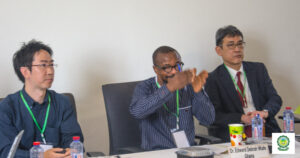
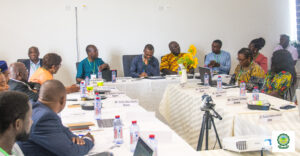
Prof. Wiafe Debrah highlighted the vital role of maize as a staple food in Ghana, emphasizing its significance in providing essential calories for a significant portion of the population. He touched on the versatility of maize, which serves not only as human food but also plays a crucial role in animal feed and industrial processes.
Addressing cultivation zones and production patterns, Prof.Wiafe Debrah discussed the geographical diversity of maize cultivation across the sixteen Regions of Ghana, such as the Northern, Ashanti, Brong-Ahafo, and Volta regions. He outlined the factors influencing cultivation choices, including climate, soil type, and rainfall patterns, while also noting the ongoing transition towards modern farming practices alongside traditional methods.
Prof. Wiafe Debrah also addressed challenges such as erratic rainfall, pests, diseases, and the need for modern farming inputs.
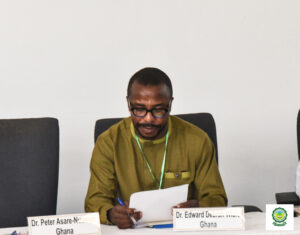
On the trading front, Pro-Vice-Chancellor touched on spatial differences in maize production and consumption which creates spatial arbitrage opportunities for traders, noting the importance of certain markets such as Techiman and Tamale markets as hubs for aggregating and distributing maize. Despite Ghana’s self-sufficiency in white maize production, the Environmentalist raised concerns about informal and undocumented imports and exports of maize which have negligible effects on domestic supply.
Regarding pricing, Prof. Wiafe Debrah highlighted the inconsistency between prices due to the seasonal nature of maize production in Ghana. He noted that while prices are initially low after harvest due to abundant supply, they rise throughout the marketing season. A series of panel sessions followed his presentation. Prof.Wiafe Debrah later moderated a session that explored challenges and opportunities in the maize market.
The second-panel session discussed crucial aspects of Ghana’s rice market, featuring a presentation by a Lecturer at UESD, Dr. Peter Asare-Nuamah. It deliberated the importance of sustainable practices and strategies to strengthen Ghana’s rice market and food security.
On day two, discussions continued with a panel session on the role of cooperatives in ensuring market transparency, led by Dr. Sifa Chiyoge from ICA Africa.
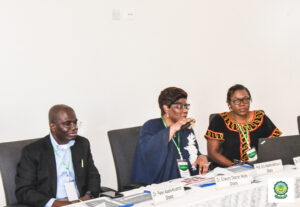
The Vice-Chancellor’s closing remarks were delivered on his behalf. Prof. Nyarko-Sampson acknowledged the significance of maize alongside other grains like rice, sorghum, and millet, stressing the need for holistic and multi-sectoral approaches to address production, post-harvest challenges, and market access. He also recognised the role of smallholder farmers in grain production in Africa, calling for interventions aimed at improving the Afriacn grain market, prioritising their needs, and promoting technological advancements and sustainable practices.
Prof. Nyarko-Sampson urged collaborative efforts among academia, government, industry, and civil society to foster a resilient and inclusive grain market supporting food security and economic development in West Africa. Prof. Nyarko-Sampson expressed gratitude to IDACA and IGC for their sponsorship, which contributed to the seminar’s success.
The two-day Regional Seminar was crowned with a field trip to the Asutuare Rice Production Area in the Shai Osudoku District of the Eastern Region.
